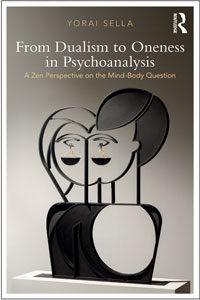By Yorai Sella (Israel)
 What is it that makes the body and mind so definitively different? Being so radically different, how do they interact? And what has the therapeutic language to do with these issues? In the West human transcendence – the humaneness of humans – has long been considered tantamount to “higher” mental faculties, equivalent to human spirit, psyche or mind, expressed via linguistic articulation. Mental and spiritual capacities have been considered the defining marks of humanity. The body – the concrete, physical abode of the mind— – often derogated, never venerated. Body-mind dualism prevails.
What is it that makes the body and mind so definitively different? Being so radically different, how do they interact? And what has the therapeutic language to do with these issues? In the West human transcendence – the humaneness of humans – has long been considered tantamount to “higher” mental faculties, equivalent to human spirit, psyche or mind, expressed via linguistic articulation. Mental and spiritual capacities have been considered the defining marks of humanity. The body – the concrete, physical abode of the mind— – often derogated, never venerated. Body-mind dualism prevails.
Freud’s project delineated a one-way interaction—“the mysterious leap from the mind to the body”—as the vantage point for the psychoanalytic revolution. Contemporary psychoanalysis has gone further, charting out a two-way body and mind reciprocity as creating “unitive experiences” such as “vitality” and “potentiality.” In intersubjective, neuro-psychoanalytical, and mystically inclined psychoanalysis, these concepts converge to constitute a paradigm shift, suggesting – in Bollas’s words—that “true embodiment is a spiritual venture.”
What these conceptualizations lack is a firm conceptual, philosophical base.
From Dualism to Oneness in Psychoanalysis (Routledge, 2018) depicts the manner in which – in innovatively reaching beyond the constraints of dualism – psychoanalysis’s paradigm shift relies on an interdisciplinary and dialogical approach. Initially investigating the contributions of phenomenology and philosophy of language, it focusses on the unique contribution of Zen-Buddhism to the validation of this paradigm shift. Zen-Buddhist mystic and philosopher Ehei Dogen’s contention that through “body and mind study of the Way” one arrives at the inevitability of “body-mind-oneness” goes a long way toward substantiating the non-duality of immanence and transcendence, subject and object, body and mind. His mystical realism – in numerous psychoanalytic articles – is an invaluable contribution to psychoanalysis’s attempts to trace the route leading from alienation and duality to what Bion has termed “at-one-ment.” It thus provides a coherent response to hitherto unfamiliar modes of intersubjective “inter-being” and to misdiagnosed self-states and psyche-somatic symptomatology. This is demonstrated in a variety of clinical vignettes.
 Yorai Sella, PhD, is a clinical psychologist, a psychoanalytic and humanistic-integrative psychotherapist, and a member of the Tel Aviv Institute for Contemporary Psychoanalysis. Having originally trained in Shiatsu and Oriental Medicine, he founded and directed the Maga school for Zen-shiatsu therapists and is the co-founder and co-director of the Dmut Institute for Integrative Psychotherapy. He teaches on the self psychology post-graduate track in the psychotherapy program, Faculty of Medicine, Tel Aviv University, where he also teaches a course on Buddhist contributions to the mind-body question in psychoanalysis. He is a member of IARPP, of IAPSP, of the steering committee of the Integrative Psychiatry service, Haemek Hospital, Afula, and of The Israeli Association for Interdisciplinary Psychotherapy. Yorai has published both fiction and poetry in Hebrew. He has practiced Tai-Chi and martial arts for the past 30 years and is a student of Zen-Buddhism.
Yorai Sella, PhD, is a clinical psychologist, a psychoanalytic and humanistic-integrative psychotherapist, and a member of the Tel Aviv Institute for Contemporary Psychoanalysis. Having originally trained in Shiatsu and Oriental Medicine, he founded and directed the Maga school for Zen-shiatsu therapists and is the co-founder and co-director of the Dmut Institute for Integrative Psychotherapy. He teaches on the self psychology post-graduate track in the psychotherapy program, Faculty of Medicine, Tel Aviv University, where he also teaches a course on Buddhist contributions to the mind-body question in psychoanalysis. He is a member of IARPP, of IAPSP, of the steering committee of the Integrative Psychiatry service, Haemek Hospital, Afula, and of The Israeli Association for Interdisciplinary Psychotherapy. Yorai has published both fiction and poetry in Hebrew. He has practiced Tai-Chi and martial arts for the past 30 years and is a student of Zen-Buddhism.
Link to publisher: https://www.routledge.com/From-Dualism-to-Oneness-in-Psychoanalysis-A-Zen-Perspective-on-the-Mind-Body/Sella/p/book/9781138579132

